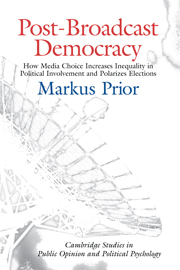 Post-Broadcast Democracy
Post-Broadcast Democracy 1 - Introduction
Published online by Cambridge University Press: 05 July 2014
Summary
In 1935, commercial television did not exist. Two-thirds of all American households (and 9 percent of all automobiles) had a radio. Almost 600 AM stations were broadcasting throughout the country. Print media continued to be the most widely available source for news. The combined circulation of the roughly two thousand daily newspapers was about 41 million, one for every three Americans.
Thirty-five years later, in 1970, television was universally available. In the average household, the television set was on for six hours each day. In more than half of all households, those hours were still in black and white. People's freedom to choose the content they liked was minimal: only half a dozen channels were available in an average household, a number that included noncommercial stations such as PBS affiliates and UHF stations, which were often received at poor quality, if at all. The three broadcast networks and their affiliates dominated television, capturing 80 percent of all viewing (with most of the remainder going to independent stations). Cable television, which delivered the lineup to about 6 percent of all homes, was still only a means to connect remote areas out of reach of over-the-air broadcast signals.
There was little to choose from, and choosing was work. Before the remote control revolution, couch potatoes had to cross the room to change channels. Perhaps it was healthy to have so little choice, as competing viewing preferences might have spelled trouble for the two-thirds of households with only one television set.
- Type
- Chapter
- Information
- Post-Broadcast DemocracyHow Media Choice Increases Inequality in Political Involvement and Polarizes Elections, pp. 1 - 26Publisher: Cambridge University PressPrint publication year: 2007
- 1
- Cited by
